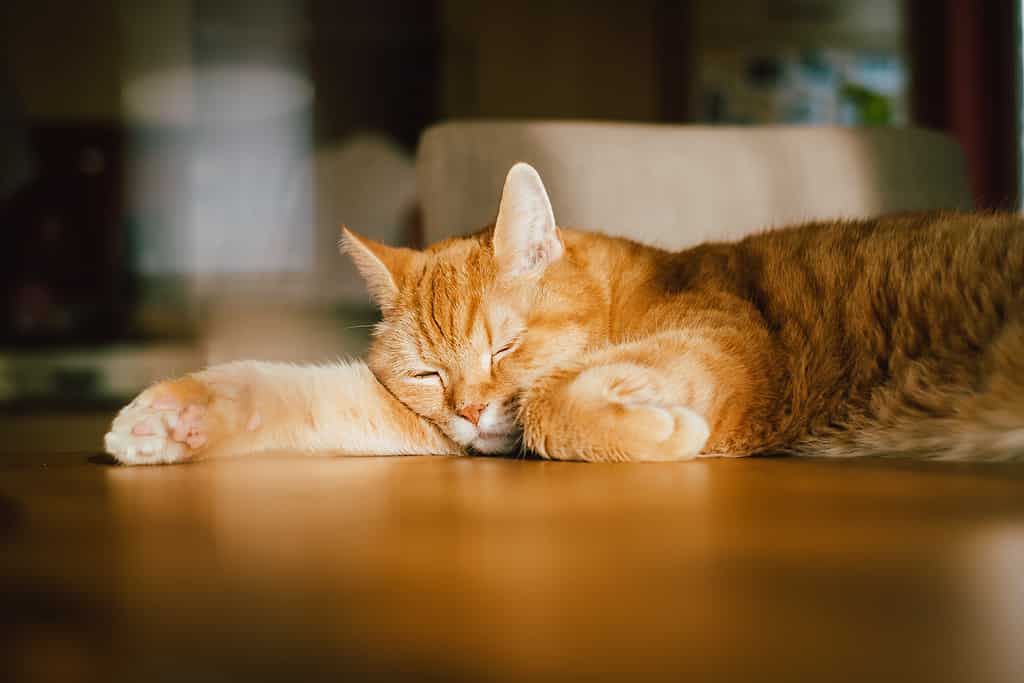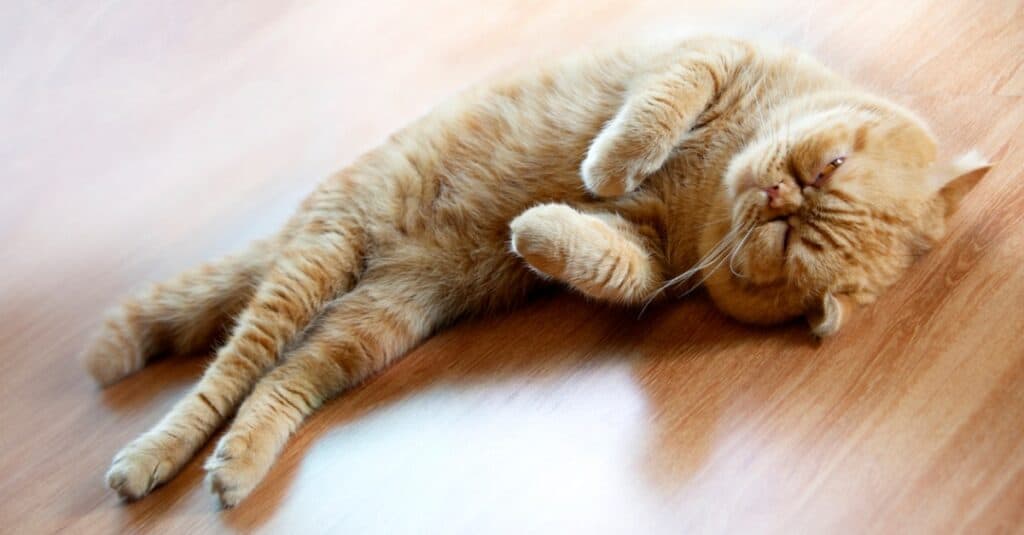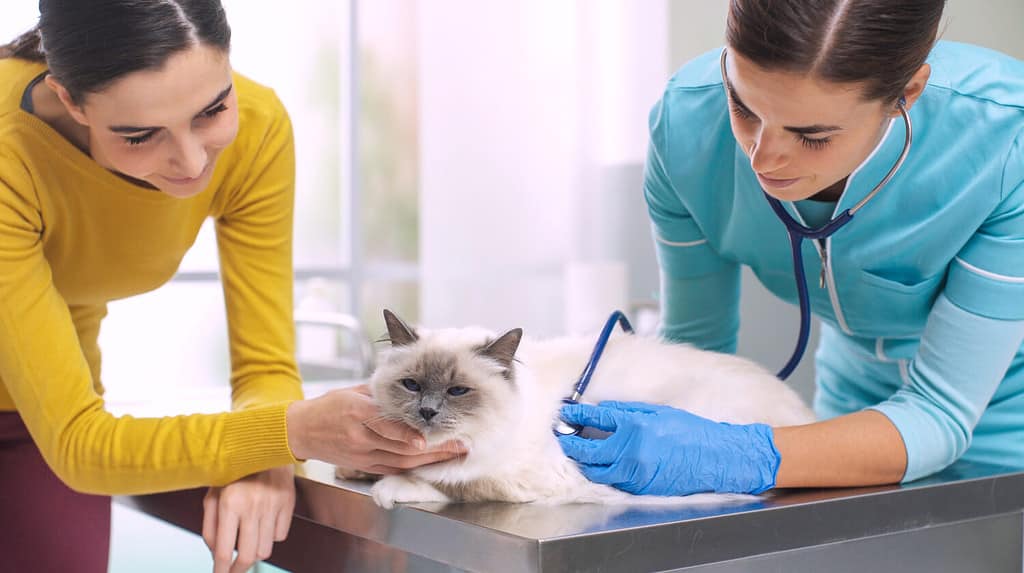A typical day for a domestic cat involves sleep, sleep, and more sleep. Felines spend the majority of their day snoozing and with the limited time they are awake, they will eat, play, groom themselves, and take care of business. Since most of their time is spent sleeping, you might hear them snore from time to time. Cats snoring is not uncommon and usually is not something to worry about, but there are instances when you might want to consider consulting with your vet.
In this article, we’ll dive into a cat’s sleeping schedule, why they snore, and when the snoring should raise a red flag.
How Often Do Cats Sleep?
Cats spend an average of 12 to 16 hours a day sleeping. It might seem excessive compared to the seven to nine hours human adults need. The truth is that in the few hours that cats are awake, they partake in energy-consuming activities such as exploring or hunting. Therefore, sleep is precious for these felines.
The amount of sleep a cat gets depends on their stage of life. Kittens are still growing and developing and will sleep close to 20 hours a day. Adult cats on the other hand usually only need 15 hours or less. Breeds, diet, and lifestyle also all affect how much a cat sleeps daily.

Cats sleep between 12 to 16 hours a day.
©Jérémy Stenuit/iStock via Getty Images
Do Cats Snore?
The short answer is yes, cats do in fact snore, but not all cats do. Some cats might even develop a snoring habit as they age. A study conducted by the Sleep Disorders Center of the Mayo Clinic found that 7% of owners who sleep with their cats at night reported snoring.
For such tiny creatures, some cats are loud snorers. Cats will typically snore during the deepest stage of sleep. They have sleep cycles, just like humans, as well as a loose flap of skin at the back of the nasal passage that lets air pass through while they breathe. When asleep, the vibrations of this flap make snoring noises.
It is easy to confuse the sounds of purring and snoring, but a cat’s purr is consistent. Snoring on the other hand will go in time with their breathing, getting louder as they exhale. You typically won’t hear your cat snoring when they’re in their REM sleep. This stage of sleeping is known to be when we dream. Pets might twitch, jerk, or squeak during this stage.
Breeds More Likely to Snore
There are some cats that are more prone to snore than others — Persian, Himalayan, or Burmese cats. This is due to the fact that these cats are brachycephalic breeds, which means they have shortened nasal passages.
Common symptoms of brachycephalic airways in cats include mouth breathing, noisy breathing, panting, coughing, getting sick, and easily getting tired.
Reasons Behind the Snoring
Most of the time, a snoring cat is not much of a worry and it won’t require a trip to the vet. A simple answer behind the heavy breathing could be that your cat is sleeping in an odd position, whether their tiny heads are upside down or smushed up against a pillow. Either way could put pressure on the nasal passage, which leads to snoring.
Like humans, cats might snore because of allergies and stuffy noses, which could also lead to heavy breathing. Cats generally will clear out the obstructions themselves, but a trip to the vet wouldn’t hurt to be certain it is not more serious, as there is no harm in being cautious.

The position a cat sleeps in could lead to them snoring.
©iStock.com/pandpstock001
When to Be Concerned about a Cat Snoring
Listen and observe your cat’s sleeping behavior to determine whether or not you need to take a trip to the vet. The following are signs you should be on the lookout.
- Lack of energy
- Respiratory problems or infections
- Gasping/wheezing while awake
- Coughing, sneezing, or gagging
- Discharge from the nose or mouth for more than two days
What the Vet Will Do
If your cat shows any of the concerning symptoms, then a trip to the vet is necessary. The visit will likely start with a full examination to see if respiratory conditions could be ruled out. The vet will also check if there are any obstructions in the nasal passage that might be causing the snoring. Surgery might be recommended to widen tiny nostrils or cut away an elongated palate.
If the snoring is caused by your cat being overweight, your vet will likely recommend changing your cat’s diet and adding in an exercise routine. The vet could also prescribe medication to reduce drainage or inflammation if he or she determines the snoring is due to allergies.

Vets will be able to rule out if your cat has any respiratory conditions or if surgery is required.
©Stock-Asso/Shutterstock.com
Ways to Reduce a Cat’s Snoring
There are ways to possibly reduce your cat’s snoring after underlying medical conditions are ruled out by a vet. These are items you can do on your end.
It would be best for smokers to quit, as the smoke can irritate your cat’s throat, nasal passages, and respiratory system. Smoking likely leads to coughing and/or snoring. If you share the room and bed with your feline companion, you might want to consider putting your cat’s bed in another room. Or at least set a tiny bed next to yours. That way the cat can fully stretch out, which may decrease snoring.
The photo featured at the top of this post is © iStock.com/Maksymowicz
Thank you for reading! Have some feedback for us? Contact the AZ Animals editorial team.







